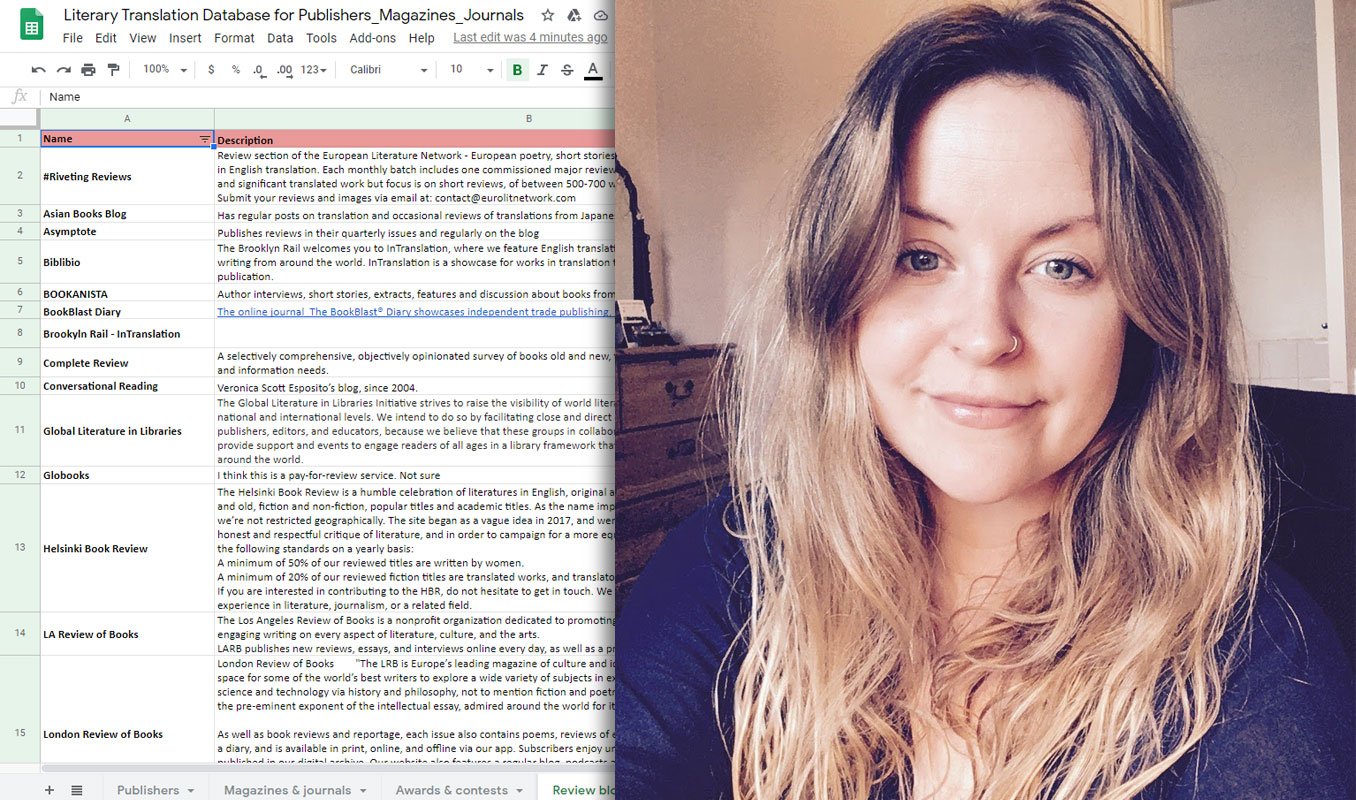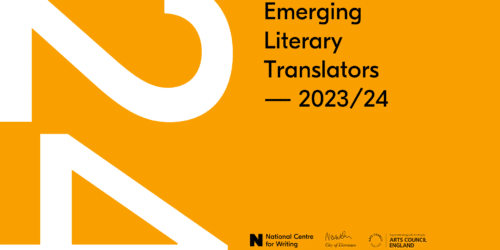
Charlie Coombe has set up an amazing Literary Translation Database full of valuable information and contacts for the literary translation sector in the UK. You can access the database here. We asked Charlie a few questions about her work, and why she set up the database.
Why did you decide to set up the Literary Translation Database?
The main answer to that is because so many other translators helped me along the way and were so supportive and willing to share information whenever I asked (even really established translators). Knowing how daunting it can be starting out in this industry – where every door can feel like it’s closed to you unless you know the right people – and knowing how many years it was before I really grasped some idea of which publishers were looking for what, I thought it would be nice to share the information I’d amassed over the years, with other literary translators, particularly emerging translators. I had been keeping an excel file – I keep many many lists in this way, I am a bit of an organisation freak – and it contained a list publishers and journals, which I would add to as and when I got to know about them. I found it a big help to refer to, when deciding where to submit work.
I just thought how great it would be to have all that information in one place, and to make it available as a ‘go-to’ resource, which other people could add to. I think it’s important to advocate for transparency, whether it’s sharing contacts with colleagues, telling people what rates you charge, or sharing information about what publishers are like to work for.
The database is basically a Google Sheet, with various tabs including Publishers, Magazines & Journals, Awards & Contests, Review Blogs/Journals, Grants & Funding, Residencies, Events & Book Fairs, Organisations & Unions, Education & Mentorships.
How did you go about it? It’s a huge amount of research. Did you have any help?
It didn’t take very long to actually set up the file – and I did it myself (apart from gathering some information from websites like PEN and Literature Across Frontiers who had put together some smaller lists of places to submit). It was more a case of sharing what I had just previously been collating. Like I said, I already had the excel file on my computer, so I just tidied it up, categorised all the information into different tabs, and added some more to it by doing a bit of research. I suppose I did put quite a lot of time into that. But I enjoy what I call ‘productive procrastination’. Then, when I felt it was fairly comprehensive, I shared it with colleagues on social media in various literary translation Facebook groups and on the Emerging Translators Network, doing a ‘shout-out’ as it were, for people to use the information contained in it, and to collaborate and grow the database.
How would you like people to use the database? What do you hope to achieve with it?
I’d love it to be the go-to source of information when a literary translator is thinking about who to pitch a translation to. It’s great because you can use CTRL+F to search for keywords like ‘poetry’ or ‘sci-fi’ or ‘children’s books’ and see which publishers fit the bill. I hope that it is also just useful for browsing through publishers, reading about who does what, and helping people to get a better overview of all the presses that are out there, big or small, as well as translation-related opportunities, residencies, courses etc. I keep being surprised when I look on there and see a publisher I haven’t heard of, so it’s informative and helpful for me too.
I’ve also shared it with a few authors for whom I have translated samples or stories, and they have found it useful for getting an overview of the publishing scene in English, and where their work might fit.
I’d love it if every time a translator discovers a new journal or publisher, their first thought is ‘ooh, I’ll add it to the database’. This industry, when you are starting out, can feel like an impenetrable fortress, and having a list like this at your fingertips is an invaluable resource, I think, so the bigger and better we make this list, the more useful it is to everyone. Sharing is caring!
Can other people update the database without consulting you or do you have overall editorial control?
Yes, absolutely. Anyone can add information by editing the Google Sheet. The whole idea is that it should be a collaborative document. Lots of people worry about messing something up, but they shouldn’t because I keep a backup! Once or twice a month I have a look, tidy anything up that needs tidying up, and save a copy to my computer – just in case someone deletes a whole load of entries by accident or anything like that.
What has been the response to the database?
Everyone seemed to think it was a fantastic idea, and I got an overwhelmingly grateful response to sharing it – which was lovely. I can see that translators have been regularly adding to it, even creating new tabs. The amount of information in there has really grown, so that is wonderful to see. I am so glad people are actually using it and getting something out of it.
Any other comments or plans?
I’d just like to say thank you to anyone who has contributed to the database, and please do keep adding new journals and publishers whenever you hear of them or update any missing or erroneous/out of date information. This is a document for the whole literary translation community and I hope it will continue to be a useful resource for many years to come.
Charlotte Coombe is a literary translator working from Spanish and French into English, who has translated authors such as Margarita Garcia Robayo and Eduardo Berti. In June 2020 along with colleague Tina Kover, she co-founded Translators Aloud, a YouTube channel designed to shine the spotlight on literary translators reading from their work. She also offers mentoring to emerging translators. Twitter: @cmctranslations







